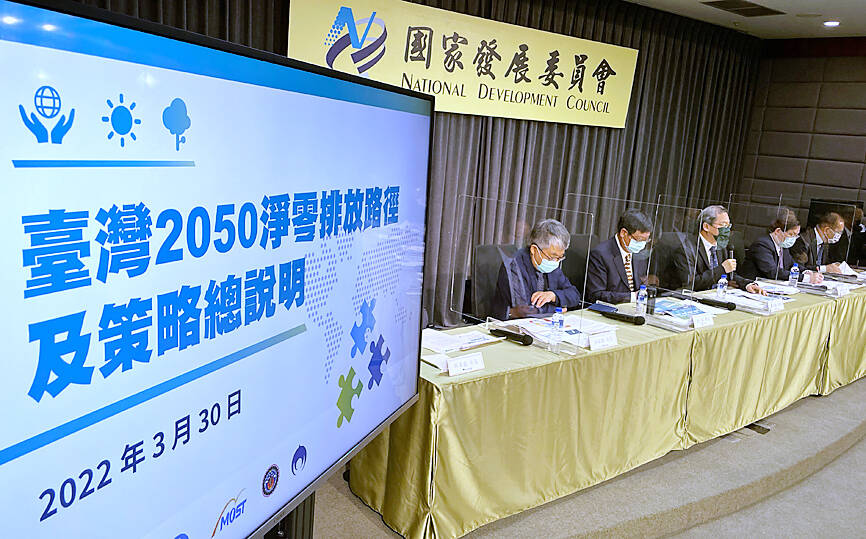A carbon exchange that is set to open in the middle of next year would help the government meet its net zero emissions goal by 2050, the National Development Council (NDC) said on Saturday.
In a statement released to mark Earth Day, the council said the exchange would help integrate resources and capital to push for emissions reduction through carbon credit trading.
The council said setting up the exchange is part of efforts to reach the 250 net zero emissions goal, which was enshrined into law by the Climate Change Response Act (氣候變遷因應法) in February.

Photo: Liu Hsin-de, Taipei Times
The act also stipulates a carbon border adjustment mechanism, which enables the government to levy fees on imports of carbon-intensive products.
As a result, Taiwan would from 2050 be bound to ensure that greenhouse gas emissions do not exceed the amount of greenhouse gases removed from the atmosphere, the NDC said.
The act also forms the legal basis for the government’s plan to collect carbon fees and introduce a carbon pricing scheme, and provides incentives to cut emissions, the council said.
Companies that are unable to reduce emissions due to high costs could purchase credits on the carbon exchange to offset their emissions, analysts said.
On Thursday, the Taiwan Stock Exchange (TWSE) announced that it is working with the National Development Fund to set up a carbon exchange.
Registration for the new platform would open in the middle of next year, it said.
The digital carbon exchange is expected to offer standardized contracts to buyers and sellers of emissions credits.
The TWSE said that it set up a task force to prepare the platform last year.
The task force has visited Japan, South Korea and Singapore to learn about carbon credit systems, it said.
After the Climate Change Response Act was passed in January, the TWSE started working with the Financial Supervisory Commission, the Environmental Protection Administration and the Ministry of Economic Affairs to expedite the establishment of the carbon exchange, it said.
The TWSE said it is planning to consult with business groups and environmental protection groups on the matter.
The carbon exchange would offer domestic and international carbon credit transactions and other services, including educational programs, the TWSE said.
The carbon exchange would help companies reach their individual carbon reduction targets and reduce their costs to reduce emissions, it said.
The platform is expected to entice Taiwanese and international companies to cooperate on emissions reduction, and help Taiwan boost its efforts to develop its economy while taking environmental protection and social sustainability into account, it said.
The NDC said that the local bourse and the National Development Fund would initially inject funds into the carbon exchange to ensure that the platform would serve as a comprehensive carbon credit exchange mechanism for Taiwan in accordance with the nation’s environmental protection rules.

KEEPING UP: The acquisition of a cleanroom in Taiwan would enable Micron to increase production in a market where demand continues to outpace supply, a Micron official said Micron Technology Inc has signed a letter of intent to buy a fabrication site in Taiwan from Powerchip Semiconductor Manufacturing Corp (力積電) for US$1.8 billion to expand its production of memory chips. Micron would take control of the P5 site in Miaoli County’s Tongluo Township (銅鑼) and plans to ramp up DRAM production in phases after the transaction closes in the second quarter, the company said in a statement on Saturday. The acquisition includes an existing 12 inch fab cleanroom of 27,871m2 and would further position Micron to address growing global demand for memory solutions, the company said. Micron expects the transaction to

Vincent Wei led fellow Singaporean farmers around an empty Malaysian plot, laying out plans for a greenhouse and rows of leafy vegetables. What he pitched was not just space for crops, but a lifeline for growers struggling to make ends meet in a city-state with high prices and little vacant land. The future agriculture hub is part of a joint special economic zone launched last year by the two neighbors, expected to cost US$123 million and produce 10,000 tonnes of fresh produce annually. It is attracting Singaporean farmers with promises of cheaper land, labor and energy just over the border.

US actor Matthew McConaughey has filed recordings of his image and voice with US patent authorities to protect them from unauthorized usage by artificial intelligence (AI) platforms, a representative said earlier this week. Several video clips and audio recordings were registered by the commercial arm of the Just Keep Livin’ Foundation, a non-profit created by the Oscar-winning actor and his wife, Camila, according to the US Patent and Trademark Office database. Many artists are increasingly concerned about the uncontrolled use of their image via generative AI since the rollout of ChatGPT and other AI-powered tools. Several US states have adopted

A proposed billionaires’ tax in California has ignited a political uproar in Silicon Valley, with tech titans threatening to leave the state while California Governor Gavin Newsom of the Democratic Party maneuvers to defeat a levy that he fears would lead to an exodus of wealth. A technology mecca, California has more billionaires than any other US state — a few hundred, by some estimates. About half its personal income tax revenue, a financial backbone in the nearly US$350 billion budget, comes from the top 1 percent of earners. A large healthcare union is attempting to place a proposal before